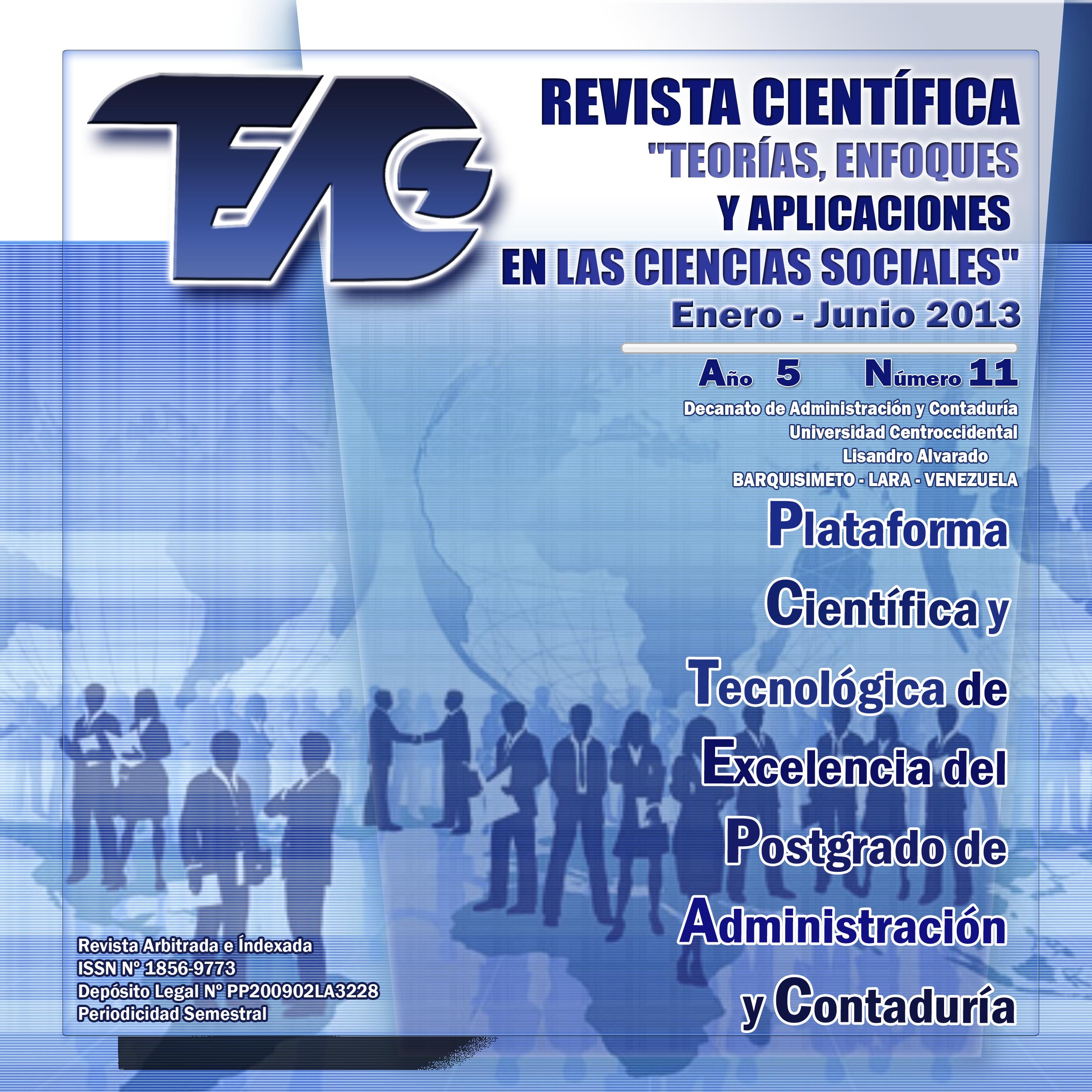E-government in Venezuela: new myths and realities
Keywords:
internet, modernization, electronic, government efficiencyAbstract
In Venezuela, we have been including government activities based on information technologies (ICTs) allowing the relationship between this and the citizens. Access to information, the application currency and documents of various kinds are being made through the Internet. Certainly it seems that the number of people looking for quick and efficient responses is steadily growing. In this sense, this research has the main objective to analyze whether information technology and especially the Internet, are being used for the delivery by the government, more and better public services to citizens, or whether otherwise have fallen into the pernicious practice of digitization of bureaucracy, which would undermine the true meaning of electronic government (E -Gov). To do this, use the documentary literature, methodology based mainly on the review of legal texts, specialized books and recent studies on e- gob in Venezuela and other countries. One of the main conclusions to those above, is that the possibilities of transformation of Venezuelan public administration through the use of ICT are enormous if really directed towards increasing the efficiency of its management.
Downloads
References
Banco Interamericano de Desarrollo. (2003). Tecnologías de información y comunicación al servicio de la competitividad y la integración sudamericana plan de acción. Documento de trabajo preparado para la Iniciativa de integración de la infraestructura regional en América del Sur (IIRSA) Volumen I (de cuatro).
Banco Mundial- CEPAL-ILPES: (2004). Comisión Económica para América Latina y el Caribe (CEPAL) e Instituto Latinoamericano y del Caribe de Planificación Económica y Social (ILPES) Gobierno Electrónico y Gestión Pública. Documento OnLineDisponibleen:http://www.cepal.org/ilpes/noticias/paginas/5/39255/GobiernoElectronico_ANaser.pdf.[Consulta realizada en Marzo 2010]
Castell, M. (2005). La Era de la Información. La Sociedad Red. Economía, Sociedad y Cultura. Editores Siglo XXI. México.
Capgemini, Rand Europe, Idc, Sogeti And Dti (2009). Faster, Smarter, Better eGovernment, 8th Benchmark Measurement (2009). European Commission, Directorate General For Information Society And Media. Documento On Line disponible enhttp://ec.europa.eu/information_society/eeurope/i2010/docs/benchmarking/egov_benchmark_2009.pdf. [Consulta realizada en Diciembre 2010].
Centro Latinoamericano de Administración para el Desarrollo - CLAD (2007). Carta Iberoamericana de Gobierno Electrónico. IX Conferencia Iberoamericana de Ministros de Administración Pública y Reforma del Estado. Pucón, Chile. (Resolución No. 18 de la Declaración de Santiago).
Comisión Europea para la Sociedad de la Información en Europa: Informe (2009) Documento On Line Disponible en: http://europa.eu/legislation_summaries/information_society/strategies/c11328_es.htm. Consulta realizada en mayo 2010)
Guzmán C. (2000)La transición hacia la sociedad del conocimiento en Venezuela (Escenarios y tendencias del mercado de las telecomunicaciones) Documento On LineDisponibleen:http://www.ulima.edu.pe/Revistas/contratexto/v6/Art%C3%ADculos/PDF/Estado%20actual%20y%20perspectiva%20de%20la%20televisi%C3%B3n%20digital%20en%20Venezuela.pdf. [Consulta realizada en abril 2009.]
Holmes D. (2003) @GOV. Estrategias para el uso de Internet en el Gobierno. Mc Graw Hill. México.
Indicadores de penetración y uso de Internet en Venezuela. Documento On Line Disponible en: http://tecno.americaeconomia.com/noticias/venezuela-tiene-una-penetracion-de-internet-del-38-con-11m-de-usuarios.[ Consulta realizada en diciembre 2011].
Internet es Mercadeo: Documento on Line, disponible en: http://internetesmercadeo.com/colombia-con-una-mayor-penetracion-de-internet-y-la-web-2-0/ [Consulta realizada en marzo 2011]. Kalakota R y Robinson M. (2001). Del E-Commerce al E-Business, El siguiente paso. Pearson Educación, México.
OECD. (2003). Organización Para La Cooperación y el Desarrollo: Development Center. Working Paper No. 189 (Formerly Technical Paper No. 189) Policies and institutions for E-commerce Readiness. What can developing countries learn from OECD experience? OECD Journal On Budgeting - Vol. 3, No. 1 - ISSN 1608-7143 - © OECD 2003.
Peguera Miguel (2005). Derecho y Nuevas Tecnologías. Editorial UOC. Barcelona España.
República Bolivariana De Venezuela: Decreto Sobre Internet Como Prioridad República Bolivariana De Venezuela De La Presidencia De La República. Decreto Nº 825 Del 10 De Mayo De 2000, Publicado En La Gaceta Oficial De La República De Venezuela Nº 36.955, De Fecha 22 De Mayo De 2000.
República Bolivariana De Venezuela: Decreto con fuerza de Ley Nro. 1.204 de fecha 10 de febrero de 2001, de Mensaje De Datos Y Firmas Electrónicas.
Ronahan. (2002). “Benchmarking E-government: A Global Perspective” Documento On Line, Disponible en: http://unpan1.un.org/intradoc/groups/public/documents/un/unpan021547.pdf. [Consulta realizada en marzo 2010]
Tendencias Digitales. (2011). Hábitos de uso de Internet. Documento On Line, Disponible en http://www.tendenciasdigitales.com/tag/habitos-de-uso-de-internet/. [Consulta realizada en mayo 2011]
Vargas C. (2010). El Gobierno Electrónico o e-Gobierno. Universidad de Granada, Granada (España) Documento On Line Disponible en: http://aprendeenlinea.udea.edu.co/revistas/index.php/unip/article/viewFile/10580/9711 Vol.11 No.1, 2010 -Versión Digital Facultad de Educación- Universidad de Antioquia. Medellín, Colombia. [Consulta realizada en Enero 2010].
Published
How to Cite
Issue
Section
Derechos del/de autor/es a partir del año de publicación
Esta obra está bajo la licencia:
Creative Commons Reconocimiento-NoComercial-CompartirIgual 4.0 Internacional (CC BY-NC-SA 4.0)
Las opiniones expresadas por los autores no necesariamente reflejan la postura del editor de la publicación ni de la UCLA. Se autoriza la reproducción total o parcial de los textos aquí publicados, siempre y cuando se cite la fuente completa y la dirección electrónica de esta revista. Los autores(as) tienen el derecho de utilizar sus artículos para cualquier propósito siempre y cuando se realice sin fines de lucro. Los autores(as) pueden publicar en internet o cualquier otro medio la versión final aprobada de su trabajo, luego que esta ha sido publicada en esta revista.



